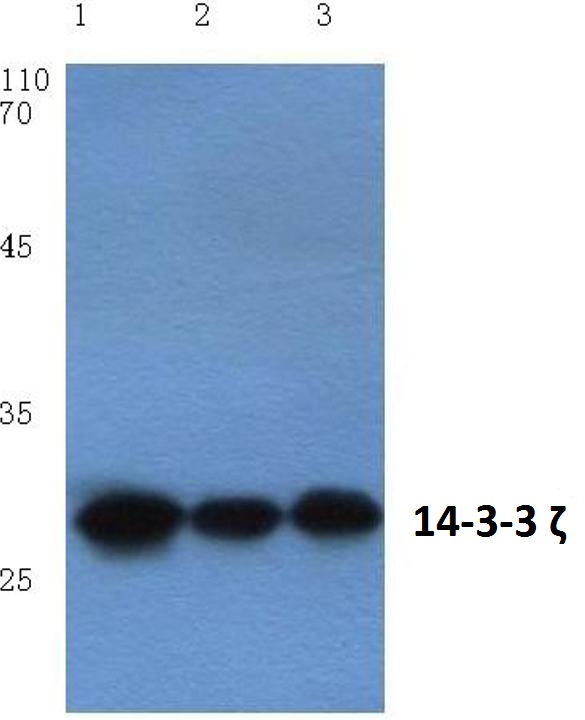14-3-3 zeta (YWHAZ) Rabbit Polyclonal Antibody
Other products for "14-3-3 zeta"
Specifications
| Product Data | |
| Applications | IF, IHC, IP, WB |
| Recommended Dilution | Western blot: 1/500-1/1000. Immunopreciptaion: 1/50-1/200. Immunofluorescence: 1/50-1/200. Immunohistochemistry on Paraffin Sections: 1/50-1/200. |
| Reactivities | Human, Mouse, Rat |
| Host | Rabbit |
| Clonality | Polyclonal |
| Immunogen | Synthetic peptide, corresponding to amino acids 20-70 of Human 14-3-3 ζ. |
| Specificity | This antibody detects endogenous levels of 14-3-3 zeta protein. (region surrounding Val52) |
| Formulation | Phosphate Buffered Saline (PBS), pH~7.2 State: Aff - Purified State: Liquid purified Ig fraction (> 95% pure by SDS-PAGE) Preservative: 0.05% Sodium Azide |
| Concentration | 1.0 mg/ml |
| Purification | Affinity Chromatography using epitope-specific immunogen |
| Conjugation | Unconjugated |
| Storage | Store undiluted at 2-8°C for one month or (in aliquots) at -20°C for longer. Avoid repeated freezing and thawing. |
| Stability | Shelf life: one year from despatch. |
| Predicted Protein Size | ~ 28 kDa |
| Gene Name | tyrosine 3-monooxygenase/tryptophan 5-monooxygenase activation protein zeta |
| Database Link | |
| Background | 14-3-3 proteins regulate many cellular processes relevant to cancer biology, notably apoptosis, mitogenic signaling and cell-cycle checkpoints. Seven isoforms comprise this family of signaling intermediates, denoted 14-3-3 β, γ, ε, ζ, η, θ and σ. 14-3-3 proteins form dimers that present two binding sites for ligand proteins, thereby bringing together two proteins that may not otherwise associate. These ligands largely share a 14-3-3 consensus binding motif and exhibit serine/threonine phosphorylation. 14-3-3 proteins function in broad regulation of these ligand proteins, by cytoplasmic sequestration, occupation of interaction domains and import/export sequences, prevention of degradation, activation/repression of enzymatic activity and facilitation of protein modification, and thus loss of expression contributes to a vast array of pathogenic cellular activities. |
| Synonyms | YWHAZ, KCIP-1 |
| Reference Data | |
| Protein Pathways | Cell cycle, Neurotrophin signaling pathway, Oocyte meiosis, Pathogenic Escherichia coli infection |
Documents
| Product Manuals |
| FAQs |
| SDS |
{0} Product Review(s)
0 Product Review(s)
Submit review
Be the first one to submit a review
Product Citations
*Delivery time may vary from web posted schedule. Occasional delays may occur due to unforeseen
complexities in the preparation of your product. International customers may expect an additional 1-2 weeks
in shipping.






























































































































































































































































 Germany
Germany
 Japan
Japan
 United Kingdom
United Kingdom
 China
China




